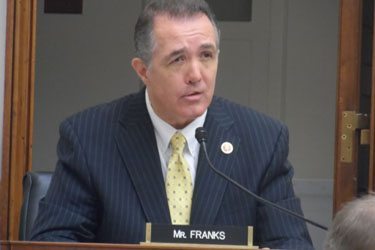Trent Franks, GOP Revive War on Women at House Hearing on 20-Week Abortion Ban
The GOP bill would ban all abortions after 20 weeks, irrespective of the circumstances faced by women and their families, and removing medical decisions from the hands of women and their doctors.

If Republicans had hopes of shoring up their credibility with women voters ahead of the midterm congressional elections, today’s hearing in the House Judiciary Committee may have just dashed them, especially when Rep. Trent Franks (R-GA) echoed the fateful claims of a vanquished Senate candidate when he claimed that rape rarely results in pregnancy.
The hearing was a mark-up session for a bill sponsored by Franks that would ban virtually all abortion beginning at 20 weeks after fertilization, setting up a challenge to Roe v. Wade, the 1973 Supreme Court case that legalized abortion and determined fetal viability as the point after which abortions may be banned, with exceptions for the health and life of the woman. Franks’ bill was framed by the National Right to Life Committee, and was first introduced as a measure that would have applied only to the District of Columbia, over which Congress has greater control than it does over the states.
But in the wake of the trial of murderer Kermit Gosnell, who ran an illegal abortion clinic in Philadelphia, Republicans on the committee sought to make hay by attempting to conflate Gosnell’s crimes—which have been condemned by all major pro-choice groups—with all abortions. The 20-week ban put forward by Franks has no chance of passage in the current Congress, since it is guaranteed defeat in the Senate, making today’s hearing a bit of a show put on in the hope of shifting public opinion on abortion.
But Franks’ remarks may result in blowback on Republicans, a result that Democrats likely hoped for when ranking member John Conyers (D-MI) offered an amendment to the 20-week ban that would have created an exception for victims of rape and incest. After Conyers introduced his amendment, Franks’ objected that the Conyers amendment did not require women claiming to have been raped to have reported the rape within a specified time period after it occurred.
The Democrats, Franks said, were “trying to make rape and incest the subject, because the incidence of rapes resulting in pregnancy are very low.” He continued: “But when you make that exception, there’s usually a requirement to report the rape within 48 hours. In this case, this is impossible, because this is in the sixth month of gestation.”
A 1996 study conducted at the University of South Carolina Medical Center found that 32.4 percent of the rape victims investigators surveyed did not realize they were pregnant until the second trimester of pregnancy. Investigators concluded: “Rape-related pregnancy occurs with significant frequency.”
“I don’t think any of us would argue that a child should be killed,” Franks said, “because of the sins of an evil rapist. What we should do is be harder on rapists…I wonder how many of my colleagues on the other side of the aisle would suggest the death penalty for the rapist, but they certainly do for the child.”
Rep. Jerrold Nadler (D-NY) suggested that Franks was implying that women would lie in order to secure a later abortion.
Among the Republicans on the committee, there are no women, a fact that Democrats took pains to note. “I just find it astonishing to hear a phrase repeated that the incidence of pregnancy from rape is low; that’s not true. There’s no scientific basis for that,” said Rep. Zoe Lofgren (D-CA). “The idea that the Republican men on this committee think they can tell the women of America that they have to carry to term the product of a rape is outrageous.”
Lofgren also noted that victims of incest are “oftentimes not in a position to report the abuse,” especially if the abuser is a young woman’s father.
Rep. Bob Goodlatte (R-VA), the committee chairman, opened the hearing with a statement citing a discredited study by physician Kanwaljeet Anand as evidence that fetuses experience pain at 20 weeks of gestation. (Franks’ bill is named the “Pain-Capable Unborn Child Protection Act.”) “Babies are babies,” Goodlatte said, “and they can feel pain at 20 weeks.”
Another member of the majority, Rep. Doug Collins (R-GA), used his wife’s personal choice to give birth to their daughter after the fetus was diagnosed with spina bifida as his rationale for embracing the 20-week abortion ban.
Nadler offered an amendment that would have allowed for exceptions to preserve the life and health of a pregnant woman.
Lofgren noted the heartbreaking story of a constituent who learned late in pregnancy that the brain of her fetus was developing outside of the cerebral cortex, and doctors told her that to bring the fetus to term would compromise the woman’s future fertility. The 20-week ban, Lofgren suggested, would not have permitted her abortion.
In the end, both Nadler’s and Conyers’ amendments were rejected, and the 20-week abortion passed through committee on a party-line vote—meaning that every vote for the bill was cast by a man.

